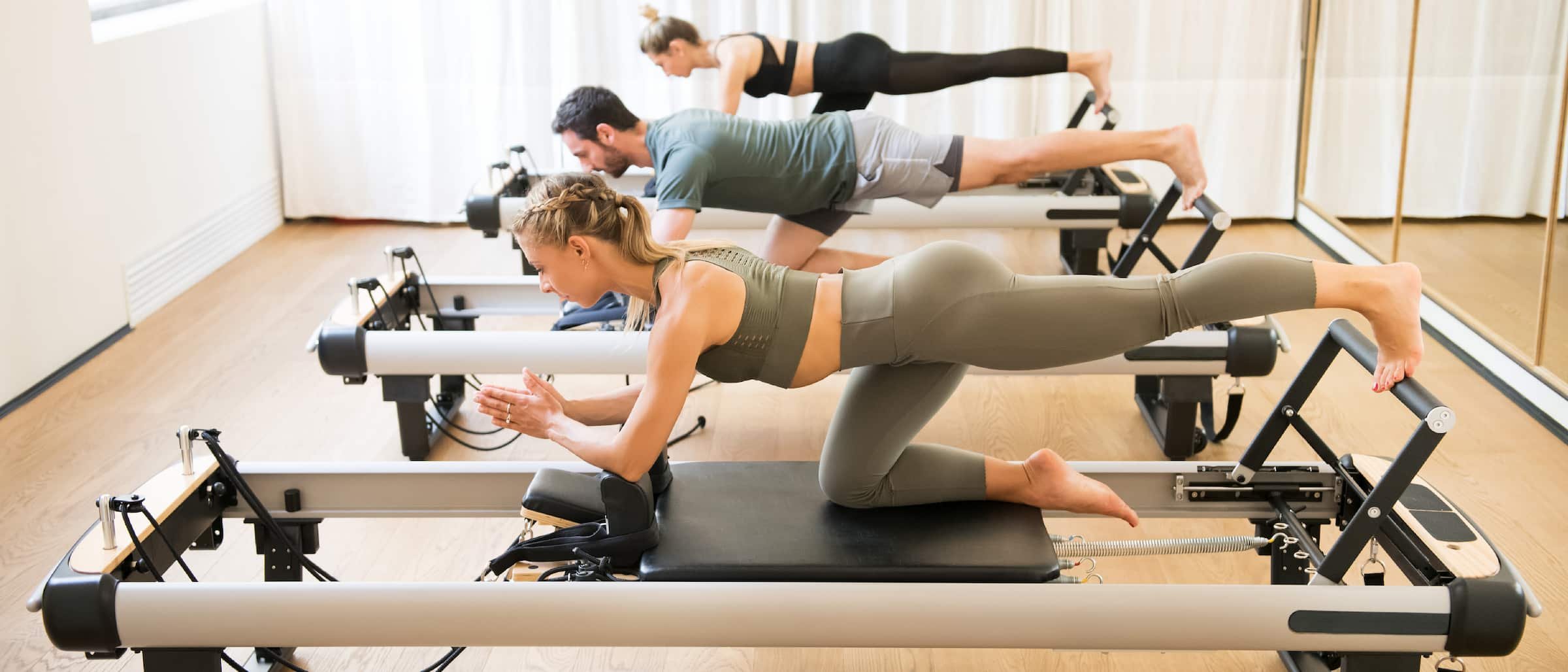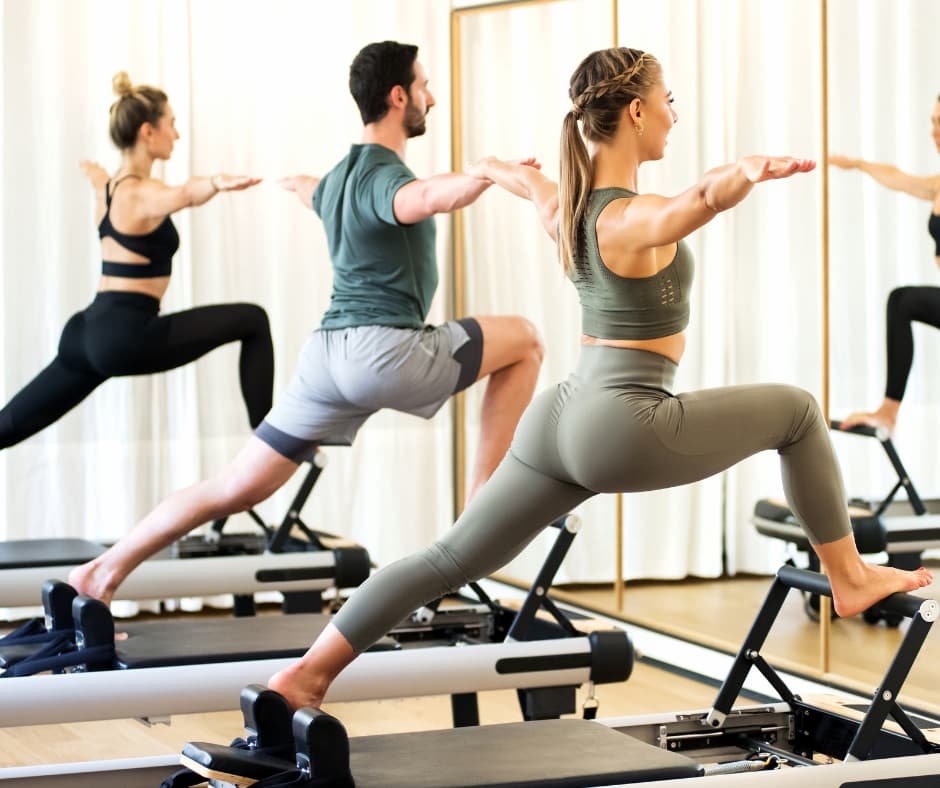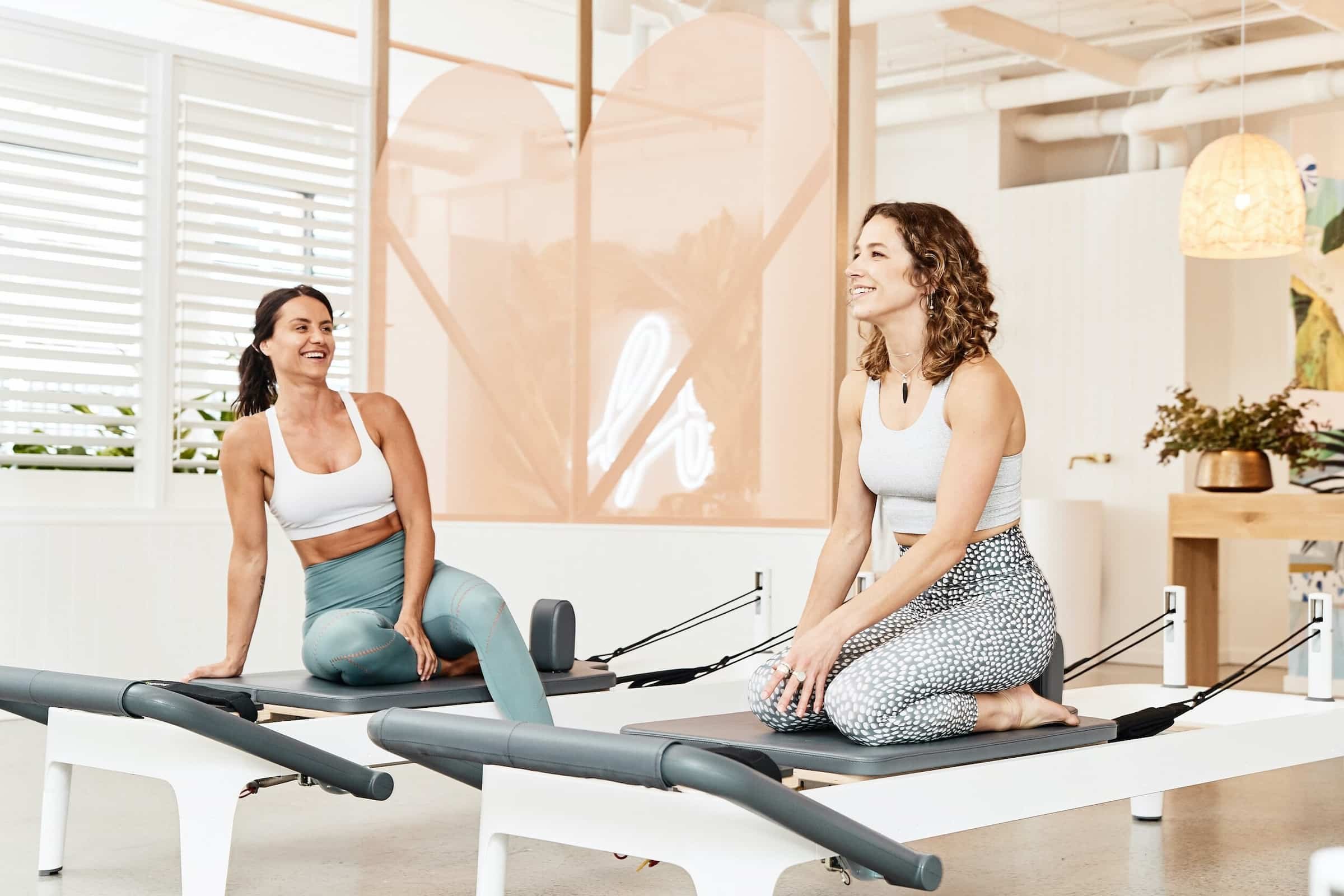Top 10 Reformer Pilates Exercises
Reformer pilates is a great place to start in the work of low-impact workouts that can strengthen the core, elongate the muscles, and shape your body. It is known for its ability to strengthen and tone the body and improves everything from muscle control to flexibility and circulation. There is nothing quite like a good reformer pilates routine. Here, we tell you all you need to know about this form of pilates, plus we share our favourite exercises to practice your movements. Plus, if you’re looking to burn some extra calories, reformer pilates is great for weight loss!
Reformer Pilates: What Is It and Why Practice It?
Mat pilates is widely known and is offered in mainstream gyms across the country. But a different kind of pilates, called Reformer Pilates, has been picking up the steam among both new and experienced users of this exercise.
Unlike pilates on mats, pilates reformer uses a bed-like frame called the carriage which can bring your general fitness routine to the next level. It offers low-impact movements that improve your stamina, build your posture, and combat the tension in your body. Most users will feel elongated and lighter as the aches and pains diminish after a session.
Designed by Joseph Pilates himself, the inventor of pilates, reformer pilates includes a great number of exercises with different strengths and resistances. And contrary to the misconception that you need to be ‘in shape’ to do this, the philosophy of pilates is to build a strong core and then progress outwards by doing these reformer pilates exercises.
10 Reformer Pilates Exercises to Try Out
Footwork
The focus of footwork on the reformer is to strengthen the leg muscles and align the body. Start with 2-4 springs depending on the amount of resistance desired. The foot bar and the headrest are up. Instead of squatting standing up, footwork pilates is performed lying down on the reformer. The actions in footwork involve pressing away from the bar with the legs extended fully. The next phase would be bending the legs and going into a squat to bring the carriage back to the starting position. There are many foot positions in reformer footwork. These include Pilates V, heels, pads of the feet, arches, and feet wide.
Leg Circles
Leg circles are one of the class favourites in group reformer training. Inhale as you lie down on the reformer and put both arms on the sides with your palms facing down. Place your feet in straps, extend your legs straight, and put it together at 90°. As you exhale, press the straps down to lower the legs to 45°. Open the legs wide and circle it around back to 90°. Engage your core as you bring the legs away from the body and into the circular motion. Change directions as necessary.
Chest expansion
Chest expansion on the reformer is an intermediate or advanced exercise that offers many amazing qualities. It may look like it is all about the arms, but it is also a great challenge for the legs and back. Start with one medium or light tension spring depending on desired resistance, and kneel against the shoulder blocks. Hold the strap in your hand and as you pull the arms back, reach down into the straps and your legs. Lift your chest and hold the carriage still as you look and stretch your neck left and right. Then reach your arms down and forward to return to the spring. For best results, repeat this 3-5 times within your reformer pilates workout.
Hundred
The hundred on the reformer is basically the same as doing it on the mat, but with straps and resistance from the springs. On the reformer, doing the hundred usually comes after the footwork. Both exercises are designed to warm and prepare the body for the whole pilates session. Start with 2-4 springs, with the foot bar down. Lie on your back as you hold the handles in both hands to bring both knees into the chest. Curl the head and out the shoulders up while you press both arms straight towards the carriage. Pump the arms as you inhale for five pumps and exhale for five pumps. Do it nine more times while ensuring the neck stays in line with the spine.
Short Box Series
The short box is one of the exercises you will be on the reformer without the assistance of the springs. The entire series consists of round, flat, side to side, twist, and tree. These movements are designed to improve your mobility, strength, stability, and muscular endurance for good posture. Start by placing the long box horizontally on the carriage, depending on your body's needs. Keep the foot bar down. If the reformer has two straps, use both and place them on the base of the feet. Press the legs out to activate more of your outer hips. There are options to sit on a sticky pad or place a long pole under your legs when doing some of the short box variations.
Elephant
Elephant on the reformer is considered for beginner, but the concept of this exercise can be as advanced as any pilates exercises. Performing the elephant is easy, but the movements will require a lot of strength and control. Stand on the reformer with the foot bar lifted. Place your feet flat on the carriage, with heels pressed against the shoulder rest. Place equal weights on both hands and feet as you move the carriage slightly toward and away from the foot bar to expand and contract the arch we’ve formed with our bodies. Doing this move will require using abdominal strength and muscles to move the carriage.
Rowing Back and Front
The focus of rowing back and forth on the reformer is to strengthen the arm and stabilise the powerhouse, which is the core. Start with one medium tension spring, depending on the resistance desire. Sit tall facing the back of the reformer with legs straight in two positions (ankles crossed or legs together). As your round back towards the springs, pull the handles into your sternum from your back. Press into the handles to keep the carriage from closing, and open your arms wide to each side. Then press your hands toward the foot bar and hook your thumbs into the springs. Lift your arms, circle them around, and reach towards your toes before you sit up. Repeat this at least three times. After row 1, start with your arms parallel to the floor and bend them to a 90-degree angle. Maintain its shape as you roll back and bring it down to the torso. Slightly increase the flexion in the spin and take the arms forward. Finish by sitting up tall and bringing the arms back to the start position. For best results, repeat movements two or three times in your next reformer pilates routine.
The Frog
Performing the frog on the reformer will help strengthen your reach and stabilise your shoulders. Starts with 2 heavy springs on the reformer and place the short strap loops on your fee. The foot bar and headrest should be down. Start with doing a short spine massage by pressing your legs out and lifting your hips. Press into the straps as you bend your knees. Reach to the ceiling and find yourself in a position like a tower. Then, without losing your reach, bend and straighten your knees. Do 3 to 5 repetitions before proceeding with other exercises.
Running
The objective of running on the performer is to align the body and strengthen the legs. Start with 3-4 springs with the foot bar and headrest up. Lie on the carriage while maintaining a neutral pelvis and spine. Place both feet onto the foot bar and press the carriage until both legs are straight. Lower the left heel underneath the foot bar as the right knee bends (same as the other side). Repeat the steps nine more times, bend both knees, and bring the carriage back in.
Teaser
Teaser on the reformer is one of, if not the most difficult exercises in the pilates repertoire. Begin in a seated position instead of the supine position as it’s much easier to control downward movements than the roll-up against gravity. Sit on the box while holding the straps. Reach the arms forward and roll off your bones into a C-curve position. Lift your legs into a tabletop and take a moment to feel the instability of the carriage. From there, roll back for one or two inches and then roll right back up.
Conclusion
These are just some of the many exercises we might do on the Pilates reformer. Each exercises can be changed, and movements can be altered in reformer pilates class to adjust the desired intensity or targeted muscles with additional choreography. Many influential people swear by the body conditioning benefits of reformer pilates. The mind-body discipline of doing the exercises above on special equipment allows a more intense, dynamic, and targeted workout. The good news is that this practice is open to all, whatever your physique or physical activity.
And remember:
“Above all, learn how to breathe correctly.” ― Joseph H. Pilates
The reformer exercises can be progressed by getting a certified instructor who will guide you all the way. They will challenge you by doing these movements, thus strengthening your body in multiple ways. All these will set you to achieve your fitness goals.



